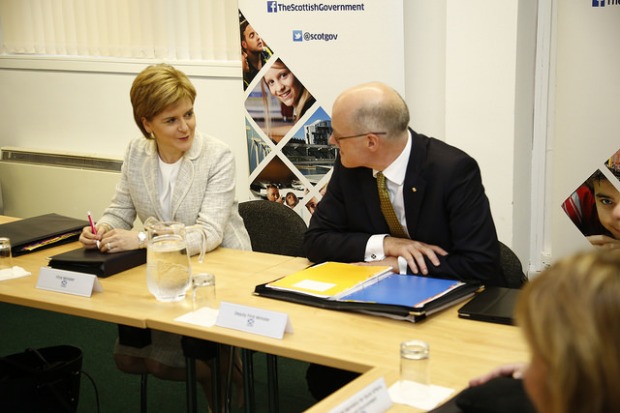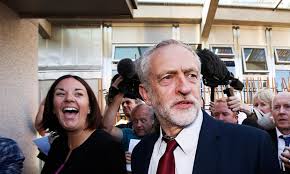
Credit: Scottish Government flickr
Louise Wilson
Eight new Bills in eight months – you have to hand it to the Scottish Government, they sure are ambitious. Especially considering they are pushing forward with this new legislation on top of work continuing from the previous Programmes for Government, including the controversial Land Reform Bill.
Nicola Sturgeon delivered the Programme for Government 2015-16 on Tuesday, which is just as jam packed as usual, but with this year the added pressure of elections in May. Scottish Parliament will officially break up in April, and whilst ministers must know fulfilling every commitment is not possible, that hasn’t stopped them. That said, given recent polls of voter intentions, it’s fair to say the SNP has a pretty good chance of continuing with this programme right up until 2021.
Kezia Dugdale and Ruth Davidson have welcomed some announcements, but were highly critical of others. Meanwhile, Patrick Harvie labeled the Programme as “cautious”. So let’s take a closer look at the new announcements…
Scottish Elections (dates) Bill
This Bill is a simple mechanical one to move the next Scottish election, which should have occurred in 2020, back a year. This ensures it does not coincide with the General Election of that year. There had been some speculation as to whether the Scottish Government would choose 2019 or 2021, given that 2019 would still definitely be under Conservative rule and therefore likely easier won by the SNP. As far as legislation goes though, this will be fast-tracked to ensure certainty on how long we our voting our next MSPs in for.
Scottish Fiscal Commission Bill
The Scottish Fiscal Commission will be placed on a statutory footing with this piece of legislation, to give them a higher level of credibility when the body independently evaluates Scottish Government budgets and spending. It will essentially be the Scottish equivalent of the Office for Budget Responsibility, especially important given the new tax powers to come with the passage of the Scotland Bill. I imagine this one will be fairly easy to pass, once the final details are all smoothed out.
Budget Bill
This one won’t take long at all – it is introduced each year to set out government spending. The difference this year is that the Scottish Government is due to take on responsibility for a Scottish rate of income tax from next April, which will have to be taken into account. Nicola Sturgeon has stated that the new rates of SRIT will be announced following George Osborne’s autumn statement.
It will be interesting to see which way the Government will choose to go on this – raising taxing just before an election is a risky political move, but lowering or keeping them the same as the UK Government could invite criticism that they are no different from the tartan Tory label they have successfully distanced themselves from. In my opinion, I think it’s likely that rates will stay the same for now – with the caveat that “things will change” once the outcome of the Scotland Bill becomes clear.
Bankruptcy Consolidation Bill
Previously announced earlier in the session, this Bill was pushed back until after the passage of the Bankruptcy and Debt Advice (Scotland) Act – which has now been in force since April. It’s very much a ‘does what it says on the tin’ job though, with tools to help manage debt, allow for ‘rehabilitation’ for those unconfident about finances, and particularly address payday loans which have been increasing over recent years.
Abusive Behaviour and Sexual Harm Bill
Essentially, this is a Bill to combat revenge porn. It should be interesting to follow given it is a huge problem, but actually quite difficult to legislate against without having a detrimental impact on other freedoms. But it’s encouraging to see the Government getting behind action to prevent such behaviour – clear recognition that “just don’t do it in the first place” is a terrible argument.
In addition, the Bill is to create a specific crime out of domestic abuse – currently a crime in the same way as other forms as violence are – which will also recognise the significant impacts on mental, as well as physical, health. It’s likely that the legislation will be highly technical in nature, and therefore potentially problematic to complete within the next eight months. However, one would hope that this is something that can receive cross party support to smooth out its passage.
Burial and Cremation Bill
This Bill follows the Bonomy Review on the cremation of babies, which reported to parliament in June this year. It will implement the 64 recommendations of the review to regulate an understably sensitive area. The legislation will have to be dealt with care as it passes through parliament, and due to its nature and the inevitably intricate elements, I question whether eight months will be long enough.
Lobbying Bill
Whilst this is more to do with how the Scottish Parliament itself functions, this will still be an important one by setting out MSPs can be lobbied on various issues. It will establish a register of public lobbying to make clearer the interests of MSPs beyond the current and less obvious mechanism.
Private Tenancies Bill
The (limited) rent controls to be introduced here are welcome. The momentum for better protection for tenants, improving the standard of rented housing and ensuring rents aren’t outrageously expensive has been building over the past few months. Shelter’s Make Renting Right campaign or the Living Rent campaign are perhaps the most high profile of these, but it has been bubbling under the surface for a while. In the last year we’ve seen rent controls introduced in cities across the West, including in Berlin. It’s great the Scotland looks set to follow suit, even if these are just baby steps at first whilst public opinion builds.
And the best thing is, it really will be a win-win situation for both tenants and landlords. It won’t put an honorous pressure on landlords to do anything beyond what any decent landlord would do – it will simply tackle sub-par landlords and those who abuse the rights of their tenants. This is something most people, I am sure, can get behind. Certainly, the safety deposit scheme has been warmly welcomed since its inception a few years ago and this should be no different.
These Bills are of course not the only thing of importance announced in the Programme for Government. It contained some controversial bits in relation to the reintroduction of standardised testing. Nicola Sturgeon also warned that the Scottish Government would recommend the rejection of the Scotland Bill changes (which would need to be passed at Holyrood after Westminster) if fiscal scrutiny issues were not satisfactory but the Bills are a good indicator for what the SNP would seek to do if (when) re-elected.



